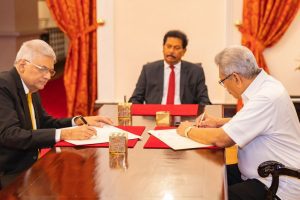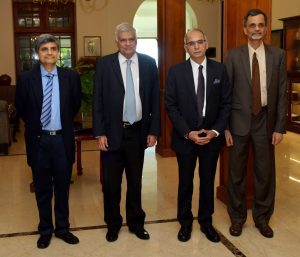A six-time prime minister, considered part of Colombo’s ‘elite’, Ranil Wickremesinghe won 134 out of 225 votes in the Presidential election.
Published Jul 20, 2022 | 6:52 PM ⚊ Updated Jul 20, 2022 | 8:04 PM

Sri Lanka's President-Elect Ranil Wickremesinghe. (Twitter/RW_UNP)
“The only house I have ever owned is now completely burnt down,” the then Prime Minister of Sri Lanka Ranil Wickremesinghe told the island nation on 11 July, two days after mobs had reduced his home to ashes. A week down the line, on Tuesday, Wickremesinghe was elected as President of Sri Lanka — a post that had eluded him for decades.
A six-time prime minister, Wickremesinghe won 134 out of 225 votes in the Presidential Election on Tuesday. The 73-year-old nephew of Junius Jayewardene, who was one of Sri Lanka’s longest-serving leaders, Wickremesinghe is considered part of the ‘old elite’ in the country’s politics.

The then Sri Lankan President Gotabaya Rajapaksa appoints Ranil Wickremesinghe as prime minister in May 2022 (Twitter/ GotabayaR)
For a man who came almost close to clinching the Presidency in 2005, Ranil has inherited a crisis-hit, imploding Sri Lanka that is facing its worst economic crisis since Independence. Despite his political rivalry with the Rajapaksa clan over the years, Wickremesinghe’s house was burnt down as he faced the wrath of Sri Lankan citizens for joining hands with the family.
Even before 2005, Wickremesinghe had fought hard to become President of Sri Lanka in 1999 — three years after his uncle and political guru Junius Jayewardene’s death.
As recently as 2020, Wickremesinghe and his United National Party (UNP) were written off. The UNP performed abysmally in the Sri Lankan Parliamentary elections in 2020 and failed to win a single seat with a vote share of just 2.15 percent.
It was not until June 2021 that Wickremesinghe himself secured a nomination in Parliament via the ‘national list’, becoming the sole member of his party. From being his party’s sole MP, Wickremesinghe has catapulted himself to being President in just a little over a year with the economic disaster creating a constitutional crisis in the island nation.
When the then President Chandrika Kumaratunga ousted him as prime minister in 2004, when he lost the Presidential polls in 2005 by a whisker, when the then President Mahinda Rajapaksa defeated the Liberation Tigers of Tamil Eelam (LTTE) in 2009, and then when his party suffered a humiliating defeat in 2020 — Wickremesinghe has been written off time and time again in Sri Lankan politics. Each time, he has made a comeback.

Ranil Wickremesinghe (2nd from left) with Indian Secretary to the Department of Economic Affairs Ajay Seth (left), Indian Foreign Secretary Vinay Kwatra (2nd from right) and Chief Economic Advisor to the Government of India Dr V Anantha Nageswaran (right) on 23 June (Twitter/@RW_UNP)
With the Presidency, his long-desired position, finally in hand, Wickremesinghe has more challenges than ever. Analysts believe his more moderate socio-political stance, liberal economic policies, and pro-West outlook may be a breath of fresh air when compared to the Rajapaksas, but worry if that will suffice to save an imploding country.
“How do you control a revolt? You will go back to someone within the hierarchy — not because you can fall back on them — but because it is in their interest to retain whatever systems were in place. Wickremesinghe belongs to the group of old political elites who were rejected due to the changing society that challenged the elite. This urge to challenge the elite leads to the rise of leaders with a degree of crudeness like Rajapaksa who whip up passions with mass hate. That is not sustainable and leads to consequences like the ones we see in Sri Lanka,” Prof Narendar Pani, political analyst and a former columnist on international politics, told South First.
Prof Pani added that out of a lack of choice, Rajapaksa’s party too has extended support to Wickremesinghe, in the hope that he will be able to restore order. “Wickremesinghe goes with the flow. Though a member of the old elite, he has retained the finesse to work with newer groups. But whether that is enough is the question,” he added.
Wickremesinghe comes with a vast experience in not just politics but also engagement with the International Monetary Fund, diplomacy and an ideology of united Sri Lanka. “The time for division is over,” he said in his first remarks as President of Sri Lanka on Tuesday.
Throughout his political career, Wickremesinghe has insisted that a united Sri Lanka was the permanent solution to the ongoing ethnic problem. During his prime ministership, Wickremesinghe engaged in peaceful negotiations with the LTTE while at the same time working towards enhancing the global foreign policy against the outfit.
An advocate by degree from Ceylon Law College, Wickremesinghe is the son of a media baron. Ever since his entry into politics in the 1970s with his uncle as his guiding force, Wickremesinghe had steered clear of corruption charges till his prime ministership between 2015 and 2019. His administration was marred by allegations of insider trading involving bank bonds.
